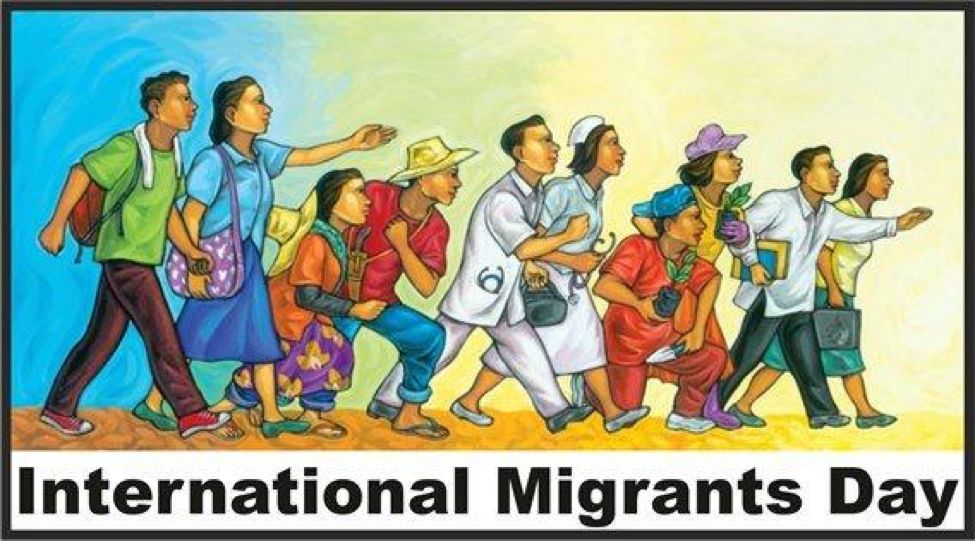Who’s in, who’s out: Migrants and a compact
The terrains that migrants and refugees traverse are as contested as the road to a global compact on migration, now under negotiations at the United Nations.

Dec. 3, 2017, will stand out as a particularly memorable Sunday for me as a United Methodist. Three events on that day implicated the lives of migrants and refugees in ways that also connected to my ministry.
I recount these three events in preparation for the International Migrants Day, Dec. 18, which I urge everyone to mark and celebrate.
Global Migration Sunday
United Methodists around the world were called by our Council of Bishops to observe Dec. 3 as Global Migration Sunday. It was a day focused on praying for and raising awareness about migrants and forcibly-displaced peoples, including refugees. It was also an occasion to collect a special offering to support ministries that will address this migrant and refugee crisis. I look forward to hearing stories how churches marked this day.
US pulls out of Global Compact on Migration
Also on Dec. 3, I was flying to Puerto Vallarta, Jalisco, Mexico. I was on my way to a United Nations stocktaking meeting to finish the consultations phase to produce a “global compact on safe, orderly and regular migration” and launch the negotiations of the compact. The process started in earnest soon after all 193 member states of the U.N. adopted the New York Declaration outlining the international community’s resolve to address large-scale movement and displacement of peoples worldwide.
Church and Society attended the New York summit that led to the declaration, and several other consultations leading up to the stocktaking in Mexico, including those held in Dhaka, Bangladesh, Geneva, Switzerland, Berlin, Germany and Vienna, Austria.
While it may be beneficial to have internet connection 30,000 feet in the sky, catching up on emails, watching a movie, or simply resting, the flashing news that “US pulls out of Global Compact on Migration” interrupted them all.
As diplomats from around the world converged in Puerto Vallarta, U.S. diplomats stayed home. The U.S. withdrew from the multilateral global compact process.
In a statement announcing the withdrawal, U.S. Secretary of State Rex Tillerson asserted that the New York Declaration, which formed the basis for negotiating a global compact on migration, “contains a number of policy goals that are inconsistent with U.S. law and policy.”
The U.S. “simply cannot in good faith support a process that could undermine the sovereign right of the United States to enforce our immigration laws and secure our borders,” Tillerson added.
Regretting the U.S. withdrawal, the president of the U.N. General Assembly, Miroslav Lajčák, stressed that a multilateral approach, not disengagement, is key to addressing international migration issues.
U.S.-based nongovernmental and migrant advocacy groups present in Puerto Vallarta responded to the U.S. withdrawal. In a statement that Church and Society joined, we said, “The US government’s decision to abandon its responsibility to being part of the global community is deeply disappointing.
“We call upon the United States to work constructively and positively to the development of a Global Compact which promotes international human and worker rights, international cooperation and responsibility-sharing.”
After the withdrawal, several U.S. cities petitioned the U.N. to include them in the negotiations.
The global stocktaking
Being part of the stocktaking was important. The stocktaking assessed where the international community was on the New York Declaration mandates. It also began the more tedious negotiations segment leading to a global compact for safe, orderly and regular migration.
The compact promises to reframe how we look at migration, perhaps ways to weed out ethnocentric and xenophobic practices. It will, hopefully, weave a narrative of human mobility that is welcoming, hospitable, human dignity-affirming, and just.
The presence of nongovernmental and civil-society organizations, including faith-based groups, is crucial in every step of the global compact process. I attended Puerto Vallarta with resources from United Methodist, ecumenical, and civil-society organizations in tow.
I was ready to advocate for a global compact that is human dignity and human rights-based, migrant- and people-centered, gender-responsive, and governed by the rule of law. Also, a global compact that recognized present migration challenges brought about by national security concerns, historical injustices like colonialism and slavery that even now mimic the migration route, and the uneven development of economies that bleed developing countries of needed talent and workforce.
While negotiations are about texts, we must never forget that the compact is about real people. We must be on guard that our language, which can be lofty and ambitious, must also be practicable so that it will make the lives of migrants better.
I was disappointed as I left Puerto Vallarta. There was growing resignation there about a nonbinding compact. Still, many, including myself, pushed for a compact undergirded by existing and enforceable international treaties and obligations already in place to protect the dignity and human rights of migrants and refugees.
But I was also excited by one particular development. The language has shifted away from “managing global migration,” to focus more on migration’s human dimensions (of people), local and grassroots dimensions (of communities) and global and planetary dimensions (of international relations and demographics).
The U.N. will host an international conference on the global compact possibly in the latter half of 2018. Navigating the contestable terrains of negotiation lies ahead.